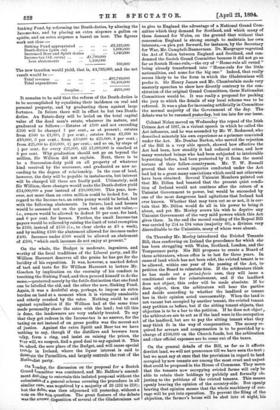It remains to be said that the reform of the
Death-duties is to be accomplished by equalising their incidence on real and personal property, and by graduating them against large fortunes. In future there will in effect be but two Death- duties. An Estate-duty will be levied on the total capital value of the dead man's estate, whatever its nature, and graduated as follows :—Estates of £100 and not exceeding £500 will be charged 1 per cent., as at present ; estates from £500 to £1,000, 2 per cent. ; estates from £1,000 to £10,000, 3 per cent.; from £10,000 to £25,000, 4 per cent. ; from £25,000 to £50,000, 4; per cent.; and so on, by steps of -1 per cent, for every £25,000, till £1,000,000 is reached at 8 per cent. Why graduation should not go on beyond the million, Sir William did not explain. Next, there is to be a Succession-duty paid on all property of whatever kind received by the successor, and graduated as now ac- cording to the degree of relationship. In the case of land, however, the duty will be payable in instalments, but interest will be charged till these are finally paid. Ultimately, said Sir William, these changes would make the Death-duties yield £14,000,000 a year instead of £10,000,000. This year, how- ever, not more than an extra million could be looked for. In regard to the Income-tax, an extra penny would be levied, but with the following abatements. In future, land and houses would be assessed not on the gross, but on the net value,- i.e., owners would be allowed to deduct 10 per cent, for land, and 6 per cent. for houses. Further, the small Income-tax payers would be relieved by raising the limit of total exemption to £160, instead of £150 (i.e., to clear clerks at £3 a week), and by making £160 the abatement allowed for incomes under £400. Incomes under £500 would be allowed an abatement of £100, "which such incomes do not enjoy at present."


































 Previous page
Previous page